With Venezuelan oil now hovering at $37 a barrel and the country enjoying a $7 billion windfall this year, Mr. Chávez's government has embarked on a spending spree that has astounded analysts and greatly improved his chances of winning on Sunday. . . .
A decisive moment in Mr. Chávez's presidency came 18 months ago, when in the middle of deepening political unrest and a crippling national strike, the president tightened the state's grasp on the national oil company, Pdvsa, (pronounced peh-deh-VEH-sah) by dismissing 18,000 antigovernment managers in a move that many analysts believed would ruin the company.
Instead, Pdvsa is today producing 2.6 million barrels a day, and has quickly turned itself around to bankroll what Mr. Chávez grandly calls his Bolivarian revolution, named for the 19th-century Latin American political visionary Simón Bolívar. . . .
The government's philosophy is neatly summed up in Mr. Chávez's new, unofficial, name for Pdvsa, the People's Oil Company, a designation symbolizing Pdvsa's central role in ratcheting up spending in the name of the poor.
"Oil is not only for a minority, so that minority can get rich," Mr. Chávez told supporters in a recent speech. "It needs to be redistributed." . . .
Some government money goes to quirky programs aimed at bringing quick political payoffs and positive headlines -- like the thousands of Argentine cows the governments says it plans to buy and hand out to the poor.
Critics charge that Mr. Chávez's antipoverty plans are piecemeal and politically motivated, that he has placed incompetent officials in positions of power, and that he is bypassing fiscal controls, with hundreds of millions of dollars in public assistance now circumventing the Congress and the Central Bank and going straight into the barrios.
Officials in the Chávez administration counter that they are shifting vast amounts of money toward a social experiment aimed at nothing less than transforming a country that in the 1970's appeared headed toward affluence but was sidetracked by corruption and government ineptitude.
The strategy for this makeover is hashed out every Monday when nine ministers, led by the minister of education, Aristóbulo Istúriz, meet around an oval table at the Ministry of Education, paintings of revolutionary era generals and statesmen lining the walls. Here, ideology is put into practice.
"Up to now, we had democracy with political rights, in the midst of profound inequality," said Mr. Istúriz, a close confidant of the president. "What we needed was to create a social democracy."
Mr. Istúriz said some programs did not start until recently because the government was busy tightening its control over Pdvsa and putting in place a new legal framework. Mr. Chávez pushed through constitutional reforms in 1999, then other laws were passed in 2001 that gave the state more say over and access to revenues, particularly from oil.
"All this allowed us to take control of the company and direct part of the earnings to social programs," Mr. Istúriz said. "Today our government is much stronger."
Much of the emphasis, he said, is on education, with high school and university classes expanded for the poor, and ambitious literacy and vocational programs for those who had never considered stepping into a classroom. Now, 12 million Venezuelans from small children to adults are enrolled in some kind of educational program, up from 9 million at the start of Mr. Chávez's government.
In all, he said, the government this year is spending more than $4.5 billion, nearly 20 percent of its budget, on education. That is equal to 6.1 percent of gross domestic product, Mr. Istúriz said, about twice the percentage of last year.
Much of the money comes from Pdvsa. Rafael Ramírez, minister of energy and mines, recently said $1.7 billion from Pdvsa's $5 billion capitalization budget now financed social programs. About $600 million is being spent on education and health care programs, another $600 million is going toward agriculture and $500 is being spent to build homes and a highway and to finance other infrastructure projects.
Another $2 billion in revenues is forming a development fund to pay for megaprojects like a hydroelectric plant, a state airline, power stations and sugar industry plants. . . .
For the people of the teeming barrios of the city, who rarely, if ever, received much attention from generations of Mr. Chávez's predecessors, the government's approach is a welcomed change.
In the Gramoven neighborhood, the construction of a clinic, a multi-use sports complex, a meeting hall, a shoe factory, housing and the country's largest subsidized market on a 56-acre plot is seen as nothing short of miraculous.
"Now there is concern for the barrios, for the people who are in need," said Víctor Rojas, a Pdvsa employee for 23 years who is helping oversee this project. "I'm sad we didn't do this before. We could have changed people's lives. They would be living in dignity, not in misery."
Not far away, in a small classroom, neighborhood people are learning to read in one program, and earning their high school equivalency diploma in another. They thank Mr. Chávez and Pdvsa, saying the company is at last benefiting them.
"We have an opportunity we never had," said Margarita Ascanio, 55, a seamstress who, with the help of a Pdvsa-financed literacy program, is learning to read. "Pdvsa now belongs to Venezuela." ("Free-Spending Chávez Could Swing Vote His Way," August 14, 2004)
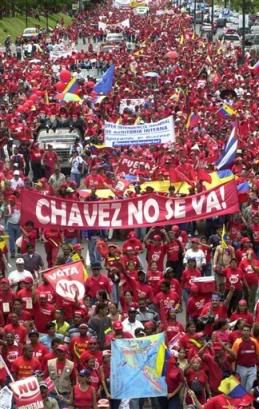
Supporters of Venezuelan President Hugo Chavez march in a 'Vote no' campaign for the upcoming Aug. 15 referendum on his rule, in Caracas, Venezuela, Sunday, Aug. 8, 2004. The banner reads 'Chavez will not go.' (AP Photo/Gregorio Marrero)
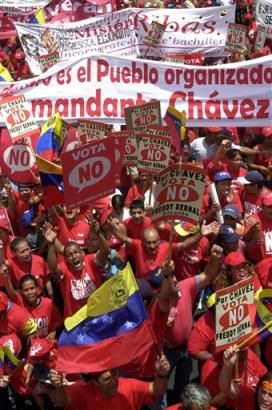
Supporters of Venezuelan President Hugo Chavez march in a 'Vote no' campaign for the upcoming Aug. 15 referendum on his rule, in Caracas, Venezuela, Sunday, Aug. 8, 2004. The signs read 'Vote No.' (AP Photo/Leslie Mazoch)
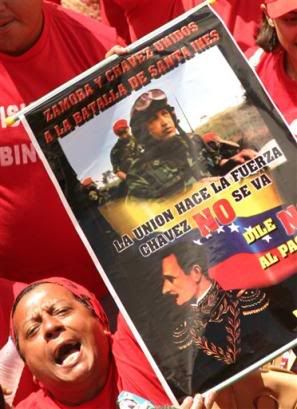
A supporter of Venezuelan President Hugo Chavez holds an image of Chavez in military fatigue at a 'Vote no' campaign march for the upcoming Aug. 15 referendum on his rule, in Caracas, Venezuela, Sunday, Aug. 8, 2004. (AP Photo/Leo Alvarez)
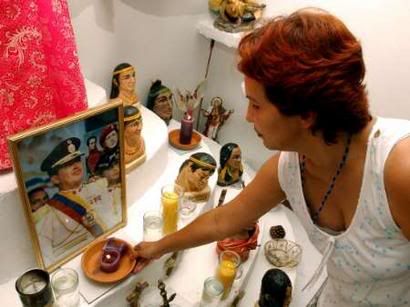
Grecheu Pereira, 42, places a candle on an altar built in support of Venezuelan President Hugo Chavez in the poor Jose Felix Ribas section of Petare neighborhood in Caracas, August 11, 2004. Chavez faces a recall referendum on his rule on Sunday and Venezuelans are sharply divided over his presidency. REUTERS/Howard Yanes
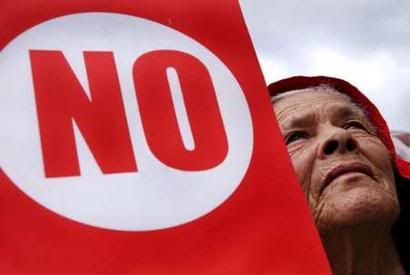
A supporter of Venezuelan President Hugo Chavez hold a poster which reads 'NO' during a march urging to vote no in the recall of the left-wing leader, in Caracas, August 8, 2004. Chavez and his opponents will face off on August 15 in a referendum to decide whether he should step down from the presidency of the world's fifth-largest oil exporter. REUTERS/Howard Yanes
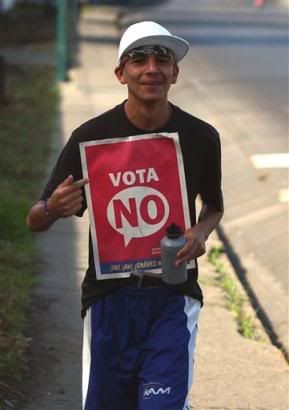
A supporter of Venezuelan President Hugo Chavez carries a sign that reads 'Vote NO' while jogging in Caracas, Venezuela Saturday Aug. 14, 2004. Supporters and opponents of Venezuelan President Hugo Chavez wrapped up campaigning ahead of Sunday's recall referendum on his rule, with neither side commanding a convincing lead in what's expected to be a bitterly contested vote. (AP Photo/Dario Lopez-Mills)
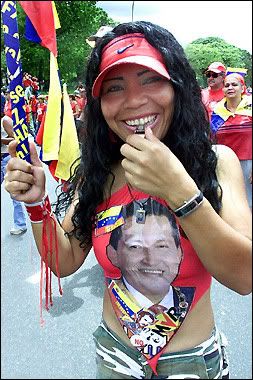
For Hugo : Supporters of Venezuelan President Hugo Chavez march in Caracas. (AFP/Andrew Alvarez)
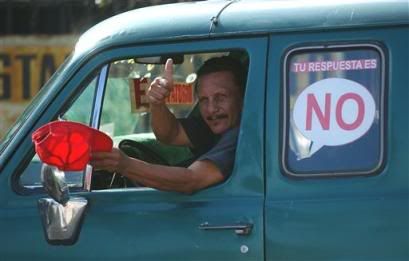
A supporter of Venezuelan President Hugo Chavez gives the thumbs up as he drives his car with a sign in the window that reads 'your answer is NO', in Caracas, Venezuela Saturday Aug. 14, 2004. Supporters and opponents of Venezuelan President Hugo Chavez wrapped up campaigning ahead of Sunday's recall referendum on his rule, with neither side commanding a convincing lead in what's expected to be a bitterly contested vote. (AP Photo/Dario Lopez-Mills)
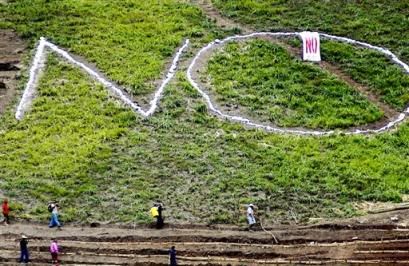
Farmers walk in a field where they carved the word 'No' to encourage Venezuelans to vote 'no' in the upcoming Aug. 15 referendum on the rule of Venezuelan President Hugo Chavez, in Caracas, Venezuela, Tuesday, Aug. 10, 2004. (AP Photo/Gregorio Marrero)
Saturday, August 14, 2004
¡Chávez No Se Va! ¡VOTA NO!
Even Juan Forero of the New York Times all but conceded that "Chávez no se va":
Labels:
Venezuela
Subscribe to:
Post Comments (Atom)




No comments:
Post a Comment